中国在朝鲜战争中的最大决策失误
历史不忍细看
本来不到一年就可以结束的战争,拖了三年,最后所得到的, 远远比两年前要少 —— 这,就是中国在朝鲜战争中最大决策失误。
本来不到一年就可以结束的战争,拖了三年,最后所得到的, 远远比两年前要少 —— 这,就是中国在朝鲜战争中最大决策失误。 ———— 引自 百度知道
送交者: 古丽静香 2013-11-11 7:29
https://zhidao.baidu.com/question/280091961.html http://site./chan1/index.php?app=forum&act=threadview&tid=13832764

由于麦克阿瑟的狂妄自大和判断严重失误,不相信中国大部队已入朝
参战,在第二次战役中,22万联合国军被38万志愿军打了个被美国史 学家称做“当代战争史上最大规模的伏击战”,于是到1950年12月时 战线又回到了三八线附近。当时二战的阴影还笼罩着整个世界,各国 都深知朝鲜战争实际上是美苏为首的两大阵营的战争,都怕战争扩大 祸及它国。于是同年12月12日,联合国13个亚洲国家的代表团起草了 《朝鲜和平方案》。印度是发起国。他们主张:“立即停火;中美两 国军队撤出朝鲜;美军撤离台湾海峡;南北朝鲜军队解除武装,由联合 国成员国组成的少量部队和联合国朝鲜委员会留在朝鲜,完成选举后 撤走。”12月14日,该提案以51票对5票(苏联、乌克兰、白俄罗斯、 波兰、捷克斯洛伐克)反对,一票(中华民国)弃权得以通过。并建 立了三人停火委员会,由联大主席安迪让、印度代表劳和加拿大代表 皮尔逊组成。13国提案对中国很有利,其中含有让毛泽东当初作出参 战决定的“美军撤离台湾海峡”的政治目标。
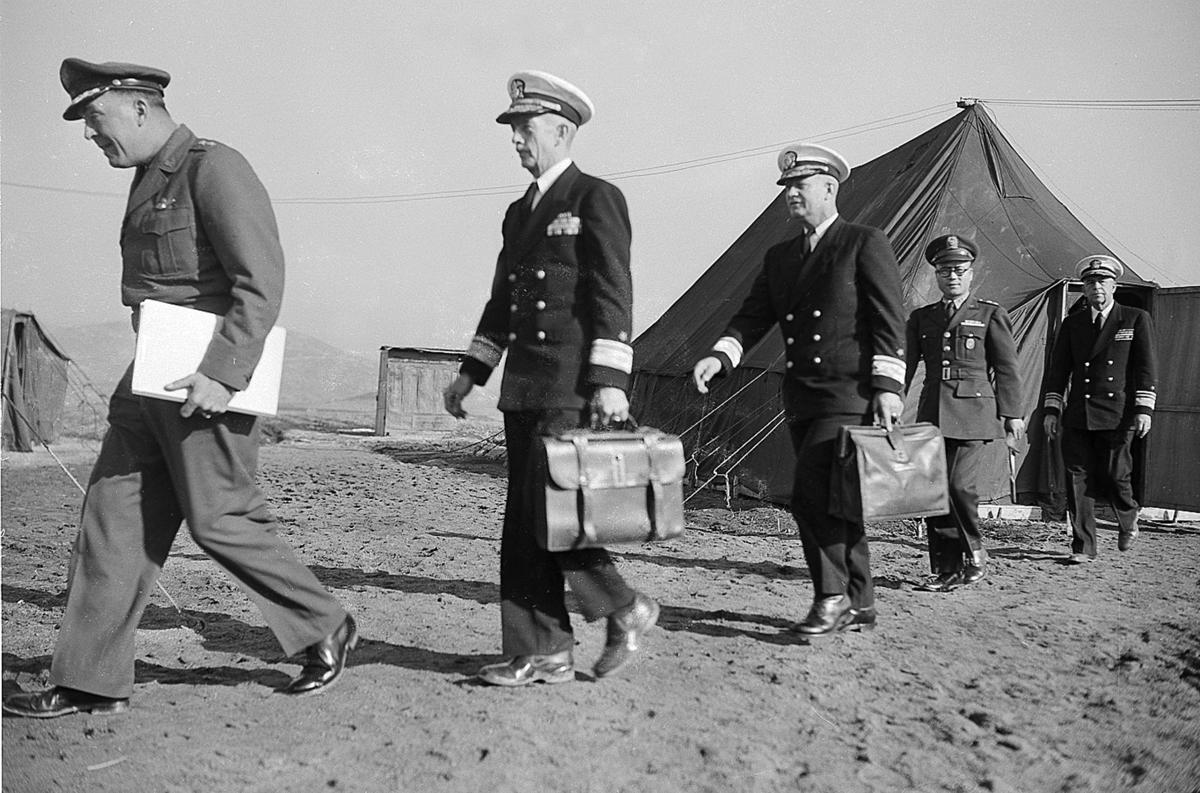
1951年联合国赴朝鲜敦促停战谈判代表团 其实,调停朝鲜冲突的最早尝试是英国和印度做出的,英国主要偏重 于和美国磋商,印度则重点与中国联系。1950年7月13日印度总理尼赫 鲁就致函斯大林和美国国务卿艾奇逊,希望冲突地方化,并通过安理 会促成和平解决。此时中国还没成立志愿军,印度也坚决反对联合国 军打过三八线。但事态并没按照印度和英国的设想发展,联合国军打 过了三八线,中国军队也进入了朝鲜,并把联合国军又打回了三八线。 
Chou En-Lai Receving The Indian Ambassador To China, Mr K.M Panikkar And Mrs Vijaya Lakshmi Pandit, Head Of The Indian Cultural Delegation
1950年12月23日,在北京的印度驻华大使潘尼迦( K.Panikkar )向 中国外交部转交了英国关于和谈而非战争解决朝鲜问题的建议。当时 中国虽没明确拒绝,却提出要把台湾问题和朝鲜问题捆绑在一起的谈 判先决条件。 而从事态发展上看, 联合国以后的议案显然是 尽量照顾了 中国的这一先决条件。
志愿军二次战役的胜利,把麦克阿瑟打得晕头转向又不明志愿军的虚 实,于是就造成了第三次战役时志愿军的战略大挺进和联合国军的战 略大撤退。因为大撤退中的联合国军不敢与长驱直入的志愿军接战, 所以第三次战役只打了8天,基本上没什么大的战斗。 


而到1951年1月8日第三次战役结束时, 志愿军的辉煌达到了整个朝鲜战争的顶点:1月4日,联合国军被迫 放弃了汉城,并全线退至北纬三十七度线以南。 但此时志愿军的攻势也到了强弩之末,只有可怜的三百多辆汽车 ( 还要时时提防突袭 ) 来维持孤军深入的几十万志愿军的给养。 不但弹药匮乏,连战士的口粮都难以保证。战士们仅穿着普通棉衣,在 零下三十度的严寒中“一口炒面一口雪”,还时常断顿。彭德怀说他 打了半辈子的仗,从来没害怕过,但那次胜利后他真感到害怕了。 感觉很孤立。 .jpg)


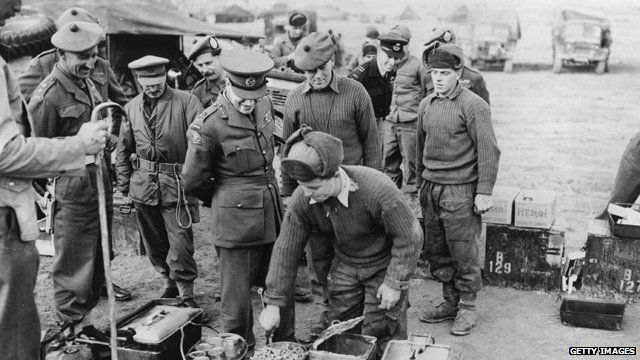


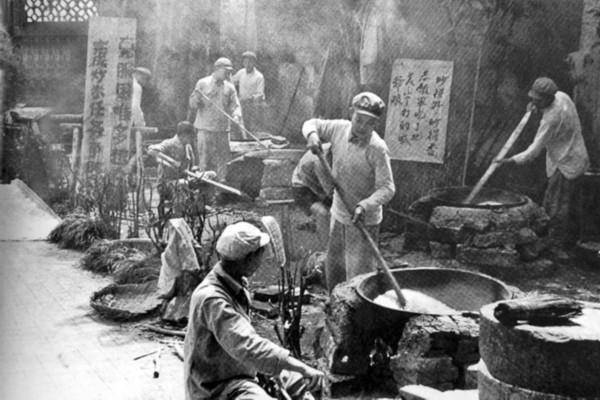


在志愿军第二次战役取得初步胜利时的1950年12月3日,金日成到北京 和中国商讨两国军队的统一指挥问题。毛泽东说:“敌人有可能要求 停战,我们认为必须承认撤出朝鲜,而首先撤至‘三八线’以南,才 能谈判停战。最好我们不但拿下平壤,而且拿下汉城……”显然此时 的毛泽东对停战方式的选择还是以和平谈判为主,但条件是联合国军 主动撤回或被打回“三八线”。然而二次战役志愿军把联合国军打成 了大撤退的“败局”,第三次战役又拿下了汉城打到了三七线, 毛泽东就觉得联合国军也不过如此而已,就彻底打消了和平谈判的念头, 坚决要把联合国军赶下大海了。
当时国际社会呼吁和平解决朝鲜问题的呼声越来越高。1951年1月11日, 联合国朝鲜停火3人小组在亚洲13国提案基础上向联大提出达成朝鲜停 火和解决远东问题的五步方案:
immediate implementation of a ceasefire; holding a political conference to restore peace; withdrawal of foreign military forces in stages and organization of elections for the Korean people and making preparations for a unified Korea. Following a ceasefire, a meeting with the participation of the UK, US, USSR and Communist China would be arranged to resolve problems in the Far East, among which would be the problems of the status of Taiwan and the representation of China in the UN.
1、立即停火; 2、一旦实现停火,即应加以利用,以便考虑为了恢复和平所应采取 的进一步步骤; 3、外国军队分阶段撤出朝鲜,并按照联合国原则使朝鲜人民能表达 关于他们未来政府的自由意愿; 4、联合国在前一条实现前,按照联合国原则指定适当临时措置管理 和维持朝鲜和平与安全; 5、停火之后建立一适当机构,其中包括由美、英、中华人民共和国、 苏,一揽子解决朝鲜问题,其中包括一揽子解决台湾问题和中国在 联合国代表权问题。
1月13日联合国大会政治委员会通过的这一决议,美国也投了赞成票。 美国的这一票是该提案得以通过的关键,如果美国投反对,即便不使 用否决权,该提案也会因6:6而不被通过。
"Reflecting the rank defeatism in MacArthur's headquarters, the United States voted in favor of the UN cease-fire resolution, even though it would have drawn the truce line south of Seoul and represented a stunning US defeat. represented a stunning US defeat. represented a stunning US defeat.
Mao, however, wanted total victory. He immediately rejected the cease-fire and ordered his troops to continue their advance to the Korean Strait and the Yellow Sea ... " Jay Taylor
美国的这一张赞成票无疑向世界宣告: 为了停战, 美国可以放弃“体面地停战”的立场,
决定不惜认输了。
Note that the resolution was very favorable to the PRC not only in the location of the truce line but in the fact that the PRC would be included ( along with the US, UK, and USSR) in the meeting to resolve the status of Taiwan and the representation of China in the UN--but the Republic of China would not.
如果当时中国发表一个同意该提案的声明就地停火,中国的胜利就不可 改变了。因为这一方案其实无论在军事上还是外交上对中国和朝鲜都是 极其有利的,中国将实现参战的几乎全部目标,可以以胜利者的姿态结 束战争,可以在在世界上赢得爱好和平的美名。可以拿汉城和三七线当 砝码进行谈判,可以拿到联合国席位,可以解决台湾问题,可以在联合 国形成中、苏、美、英四大国鼎立的局面。而对于北朝鲜,“外国军队 分阶段撤出朝鲜” 则可以保障它的安全。
https://books.google.ca/books?id=DUg2KGMQWHQC&pg=PA448&lpg=PA448&dq=Reflecting+the+rank+ defeatism+in+MacArthur% 27s+headquarters,&source=bl&ots=R0xZG_NN23&sig=oYkNqDlvUQ23TDHu9mmOrt1gk6A&hl=en&sa =X&ved=0ahUKEwjhnY7BiJLXAhVi44MKHa5PBFkQ6AEIKDAA#v=onepage&q=Reflecting%20the%20rank %20defeatism%20in%20MacArthur's%20headquarters%2C&f=false
美国极不愿意在这种军事不利的情况下讨论政治问题,在被中国军队 拿下汉城并打到三七线时进行谈判无疑是件极为丢脸的事,尤其是谈 判要还包括台湾和中国在联合国代表问题。但是在国际呼吁和平的巨 大舆论压力下,美国不得不被迫投了赞成票。美国当时是进退两难, 同意就将“失却朝鲜人民的信任,并引起国会和舆论的愤怒”,不同 意就会“失去在联合国的多数支持”。最后,美国权衡利弊,还是同 意了, 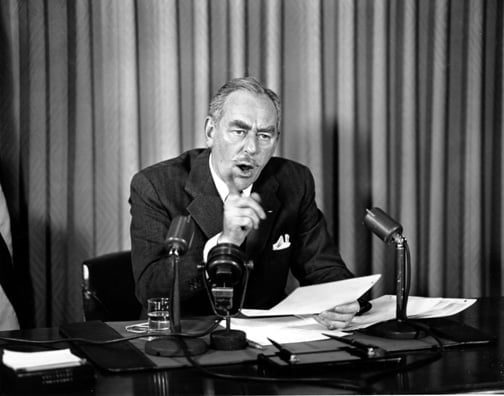
Dean Gooderham Acheson (pronounced /ˈætʃɪsən/; April 11, 1893 – October 12, 1971) was an American statesman and lawyer. As United States Secretary of State in the administration of President Harry S. Truman from 1949 to 1953, he played a central role in defining American foreign policy during the Cold War.[2] Acheson helped design the Marshall Plan and was a key player in the development of the Truman Doctrine and creation of the North Atlantic Treaty Organization.
因为美国的决策人(主要是艾奇逊)根据此前中国政府对待十三国方 案的立场,判定中国政府极有可能也会拒绝这个方案,他们“热切地 希望并相信中国领导人会拒绝这一决议。”结果正如美国所希望的, 毛泽东被用志愿军的尸体推积起来的“胜利”冲昏了头脑,梦想把联 合国军赶出朝鲜半岛实现绝对胜利。所以1951年1月17日,周恩来致 电联合国,明确表示不同意该方案中“先停战后谈判”的原则。理由 是这个方案“只是为美国军队取得喘息时间”,拒绝了该提案。
中华人民共和国中央人民政府外交部部长周恩来1951年1月17日回绝 该项提案、致电联合国 Acting 秘书长戴维·欧文先生电报全文:
The response came in the following telegram sent from Chou En-lai to the Acting Secretary-General of the United Nations, David Owen:
“Peking, 17 January 1951. “I have the honour to acknowledge receipt of the cablegram dated 13 January 1951, transmitted by Mr. Owen at the request of the First Committee of the General Assembly, on the principles concerning the Korean and other Far Eastern problems. In the name of the Central People’s Government of the People’s Republic of China I wish to reply as follows:
“1. The Central People’s Government of the People’s Republic of China has always maintained and still maintains that a rapid termination of the hostilities in Korea should be sought by negotiations among the various countries concerned with a view to the peaceful settlement of the Korean question on the basis of the withdrawal of all foreign troops from Korea and the settlement of Korean domestic affairs by the Koreans themselves; that United States armed forces must be withdrawn from Taiwan (Formosa); and that the representatives of the People’s Republic of China must assume their rightful place in the United Nations. These principles were also mentioned in my statement of 22 December 1950; transmitted by cable to Mr. Entezam, President of the General Assembly, on the same day, and are now well known to the whole world.
“2. On 13 January 1951, the First Committee of the United Nations General Assembly adopted, without the participation of the representative of the People’s Republic of China, various principles concerning the Korean and other Far Eastern problems, the basic points of which are still the arrangement of a cease-fire in Korea first, and the conducting of negotiations among the various countries concerned, afterwards. The purpose of arranging a cease-fire first is merely to give the United States troops a breathing space. Therefore, regardless of what the agenda and subject-matter of the negotiations may be, if a cease-fire comes into effect without first conducting negotiations to fix the conditions therefor, negotiations after the cease-fire may entail endless discussions without solving any problems. Besides this fundamental point, the other principles are also not clearly defined. It is not clearly stated whether the so-called existing international obligations refer to the Cairo and Potsdam Declarations, and this may easily be utilized to defend the position of aggression maintained by the United States in Korea, Taiwan and other parts of the Far East. We understand that many countries in the First Committee agreed to the principles adopted on 13 January 1951 because of their desire for peace. It must be pointed out, however, that the principle of a ceasefire first and negotiations afterwards would only help the United States to maintain and extend its aggression, and could never lead to genuine peace. Therefore, the Central People’s Government of the People’s Republic of China cannot agree to this principle.
“3. With a view to a genuine and peaceful solution of the Korean problem and other important Asian problems, I hereby submit, in the name of the Central People’s Government of the People’s Republic of China, the following proposals to the United Nations:
“(a) Negotiations should be held among the countries concerned on the basis of agreement to the withdrawal of all foreign troops from Korea and the settlement of Korean domestic affairs by the Korean people themselves, in order to put an end to the hostilities in Korea at an early date.
“(b) The subject-matter of the negotiations must include the withdrawal of United States armed forces from Taiwan and the Taiwan Straits and Far Eastern related problems;
“(c) The countries to participate in the negotiations should be the following seven countries: the People’s Republic of China, the Soviet Union, the United Kingdom, the United States of America, France, India and Egypt, and the rightful place of the Central People’s Government of the People’s Republic of China in the United Nations should be established as from the beginning of the seven-nation conference; “(d) The seven-nation conference should be held in China, at a place to be selected.
“4. If the above-mentioned proposals are agreed to by the countries concerned and by the United Nations, we believe that it will be conducive to the prompt termination of the hostilities in Korea and to the peaceful settlement of Asian problems to hold negotiations as soon as possible.
Chou En-lai Minister for Foreign Affairs of the Central People’s Government of the People’s Republic of China” ( U.N. document A / C.1 / 653 )
针对周恩来致电,美国国务卿艾奇逊即刻发表声明:
Following receipt of the Chinese message, Mr. Acheson released the following statement:
“The reply of the Chinese Communists to the United Nations ceasefire proposal is still further evidence of their contemptuous disregard of a world-wide demand for peace. Their so-called ‘counterproposal’ is nothing less than an outright rejection.
“Once again, the Peiping regime has shown a total lack of interest in a peaceful settlement of the Korean question.
“There can no longer be any doubt that the United Nations has explored every possibility of finding a peaceful settlement of the Korean question. Now, we must face squarely and soberly the fact that the Chinese Communists have no intention of ceasing their defiance of the United Nations.
“I am confident that the United Nations will do that. The strength of the United Nations will lie in the firmness and unity with which we now move ahead.” ( Department of State Bulletin, January 29, 1950, page 164 )
其实,相比较于13国提案,五步方案更全面地考虑了中国的利益, 在满足中国要求方面超过了联合国以往所通过的任何方案,而且是在 美国明确表态认可后交给中国的,
与周恩来在十天前(1950年12月22日)提出的要求 几乎是完全符合的 (???)。
与周恩来在十天前(1950年12月22日)提出的要求 几乎是完全符合的 (???)。
1950年12月22日,周恩来发表声明说,“我们坚持一切外国军队撤出朝鲜及朝鲜内政 由朝鲜人民解决为和平调处朝鲜问题的谈判基础,美国侵略军必须退出台湾,中华人民 共和国的代表必须取得联合国的合法地位……朝鲜问题和亚洲重要问题的和平解决,离 开这几点是不可能的”。 而在前一天,毛泽东已经命令彭德怀“发动另一次战役”并 “跨过三八线”。
特别是该方案建议召开一次专门议,“由美国、英国、苏联和中华 人民共和国四国代表举行会议讨论远东问题,其中包括台湾问题和 中国在联合国的代表权问题。”实质上是承认了中国为世界四巨头 之一,这将使中国获得雅尔塔会议上中国不曾获得的地位.有了四巨 头之一的政治地位。不仅在联合国的代表权问题解决起来不在话下, 也为台湾问题的解决大开方便之门。代表了众多中小国家意见的五 步方案对中国十分有利,赞同五步方案就是与众多中小国家结成统 一战线,而毛泽东却把统一战线拱手让给了美国。
拒绝五步方案使中国在法理上处于被动地位,在世界上失掉了大 多数国家的理解和同情,中国的政治地位急速下降了,中国在世 界上的形象由此变成了好战的独裁国家,而且一直延续了许多年 都不得翻身。拒绝五步方案是中国在朝鲜战争中政治斗争的转折 点,由主动彻底转为被动,毛泽东不认真对待和平解决朝鲜问题 的五步方案,是一个很大的政治错误。
中国的拒绝让美国喜出望外,自然要利用中国给它送去的大好机会来 用不丢脸的方式来解决朝鲜问题。此时务实的李奇薇已经接替了好大 喜功的麦克阿瑟,而且从过去的战例中分析出了志愿军的弱点。他看 到了由于志愿军的后勤严重不足,每次战役时的口粮弹药只能携带一 个星期的,打完七天就进入了弹尽粮绝难为无米之炊的困境,就是李 奇薇说的“星期攻势”。麦克阿瑟打败仗是因为他没能知已知彼,在 不了解对手最基本的情况,甚至在不知道对手在什么地方的情况下打 遭遇战:而志愿军打的却是有准备的进攻战。于是李奇薇制定了找到 对手顶过一星期再进入反攻的战术,于中国拒绝方案后的1月25日发 动了全面进攻。而主动进攻的“正当理由”则是中国拒绝和平谈判。 其结果是不仅破坏了中朝联军休整和准备再战的计划,也使得印度等 国试图继续呼吁停战谈判的努力变得毫无意义。 
面对联合国军的全面反攻,彭德怀等人知道形势不妙,在和金日成、 高岗等协商后,于1月27日电告毛泽东:“为增加帝国主义内部矛盾, 可否播发中、朝两军拥护限期停战,人民军和志愿军从乌山、太平里、 丹邱里线北撤15至30公里的消息,如同意请由北京播出。”如果按此 建议行事,中国在政治上就占据了主动,李奇微的进攻就会受到国际 舆论的掣肘和约束,横城反击战后战事很可能会停顿下来,中国则避 免了在军事上完全转入被动。
但, 1951年1月28日毛泽东复电:“我军必须立即发起第四次战役, 以歼灭两万至三万美李军,占领大田、安东之线以北区域为目标。” 要求彭德怀整师建制地消灭美军。此后休整二到三个月,再发动“带 有最后性质的第五个战役”。此决定得到了斯大林的肯定和支持。
四次战役失利,依托于四次战役上的第五次战役就更显底气不足。不 但没能实现战役既定目标,反而让联合国军于5月20日发起全线进攻。 因此彭德怀于5月26日以志愿军党委的名义向中共中央报告:目前部队 干部情绪消沉,对战争长期性感到厌倦,顾虑今后作战会更加困难, 对战争能否取胜产生怀疑,某些干部甚至违抗命令,官兵关系不正常, 破坏纪律现象相当严重 …… 
在这种状态下,中朝军队遭受了重大损失并被迫撤退,最后终于把 战线稳定在了“三八线”附近。朝鲜战争又回到了战前的原点。
你从未见过的1951年2月1日联合国安理会通过决议谴责中国拒绝停火 提案、继续侵入朝鲜、大规模攻击联合国军武装力量英文版全文:
Resolution 498 (V), Adopted by the United Nations General Assembly, February 1, 1951 The General Assembly, Noting that the Security Council, because of lack of unanimity of the permanent members, has failed to exercise its primary responsibility for the maintenance of international peace and security in regard to Chinese Communist intervention in Korea,2
Noting that the Central People’s Government of the People’s Republic of China has not accepted United Nations proposals to bring about a cessation of hostilities in Korea with a view to peaceful settlement, and that its armed forces continue their invasion of Korea and their large- scale attacks upon United Nations forces there,
1. Finds that the Central People’s Government of the People’s Republic of China, by giving direct aid and assistance to those who were already committing aggression in Korea and by engaging in hostilities against United Nations forces there, has itself engaged in aggression in Korea;
2. Calls upon the Central People’s Government of the People’s Republic of China to cause its forces and nationals in Korea to cease hostilities against the United Nations forces and to withdraw from Korea;
3. Affirms the determination of the United Nations to continue its action in Korea to meet the aggression;
4. Calls upon all States and authorities to continue to lend every assistance to the United Nations action in Korea;
5. Calls upon all States and authorities to refrain from giving any assistance to the aggressors in Korea;
6. Requests a Committee composed of the members of the Collective Measures Committee as a matter of urgency to consider additional measures to be employed to meet this aggression and to report thereon to the General Assembly,3 it being understood that the Committee is authorized to defer its report if the Good Offices Committee referred to in the following paragraph reports satisfactory progress in its efforts;4 7. Affirms that it continues to be the policy of the United Nations to bring about a cessation of hostilities in Korea and the achievement of United Nations objectives in Korea by peaceful means, and requests the President of the General Assembly to designate forthwith two persons who would meet with him at any suitable opportunity to use their good offices to this end. This resolution was adopted at the 327th plenary meeting of the General Assembly by a vote of 44 in favor, to 7 opposed, with 9 abstentions. The countries opposing were the same as those who had opposed during the vote in the First Committee on January 30; those abstaining were also the same with the addition of Saudi Arabia, whose delegate entered for the record a statement that his abstention indicated non- participation in the voting. (U.N. document A/PV.327)↩ On the preceding day, the Security Council had unanimously adopted a resolution (S/1995) proposed by the British Delegate calling for removal from its agenda of the item “Complaint of aggression against the Republic of Korea”. The Soviet Delegate voted in favor on the grounds that this item had originally been included on the agenda illegally during the absence of the Soviet and Chinese (Communist) Representatives. (U.N. document S/PV.531)↩ For documentation relating to the work and conclusions of the Additional Measures Committee, see pp. 1874 ff. On May 18, 1951, the General Assembly adopted Resolution 500 (V) calling for a strategic embargo against the two countries; for text, see p. 1988.↩ Prior to the vote on the resolution as a whole, a separate vote was taken on this paragraph at the request of the Representative of Israel. The paragraph was approved by a vote of 43 to 7, with 8 abstentions.
拒绝方案的结果是志愿军不但遭到了联合国军的全面进攻,在2月1日, 联合国政治委员会更进一步顺理成章地以44票对7票(全为弃权,无反 对票)通过美国提出的谴责中国为侵略者的提案。其中就连本来反对把 中国作为侵略者的英国(顾忌香港问题)都同意了,而中国在联合国席 位问题及台湾问题自然也就被搁置起来了。5月18日,联合国大会又通 过对中国大陆实行禁运的决议,有43个国家接受并贯彻了这一决议,其 中不少是原先向中国出口战略物资的国家。迫使中国经济更依赖于苏联 及其东欧国家。而朝鲜战争因此不得不延长了两年多,让中朝付出了本 不应付出的沉重代价。
对照1953年7月几方签定的朝鲜停战协议,会发现1951年初联 合国提出的这一停战提案的条件对于中国要有利的多,却因毛泽 东的短视,而失去了一次绝佳的机会!
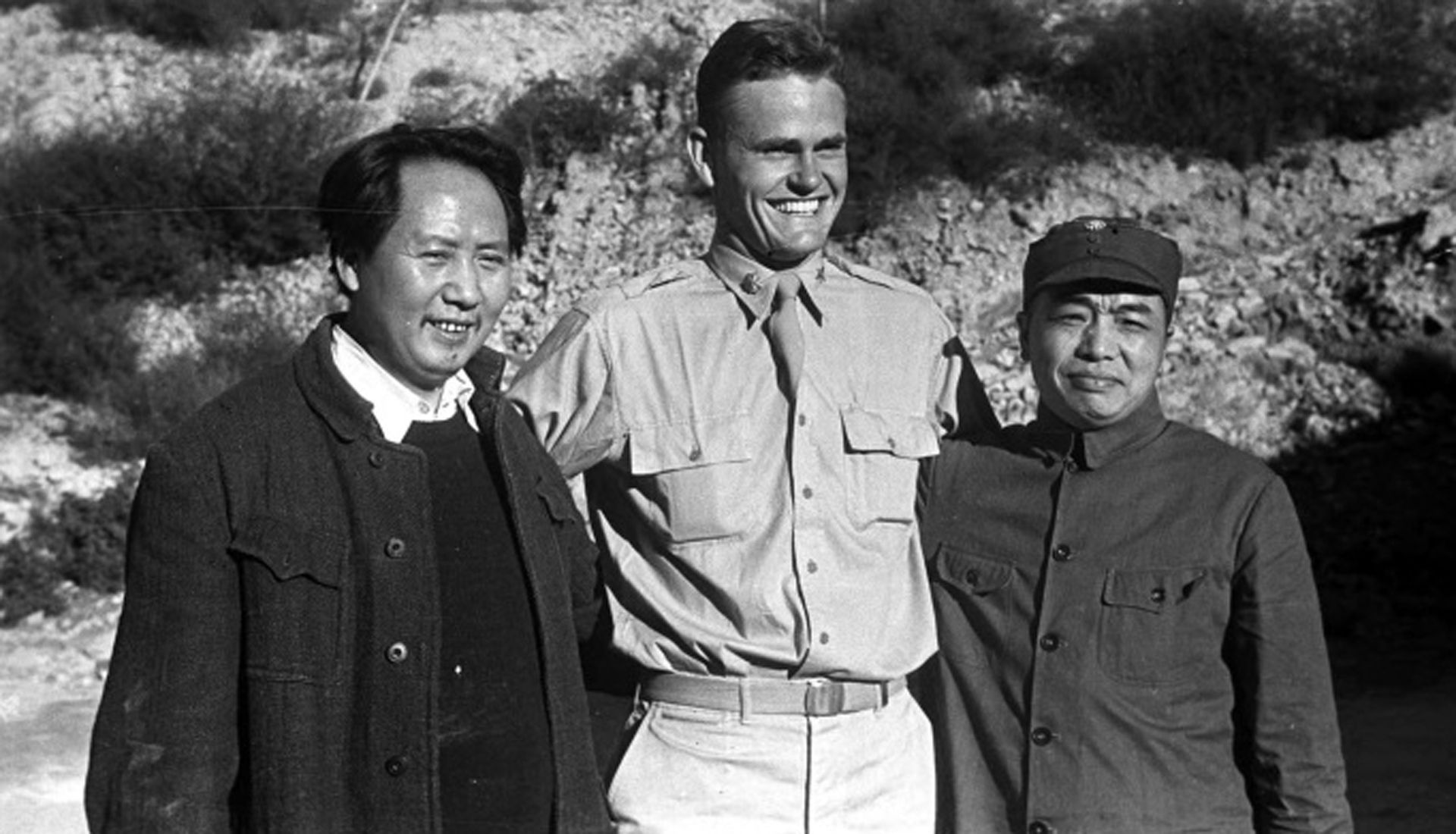
摄于 1944年 

M-4“谢尔曼”抵不住 T-34 
美式先进武器 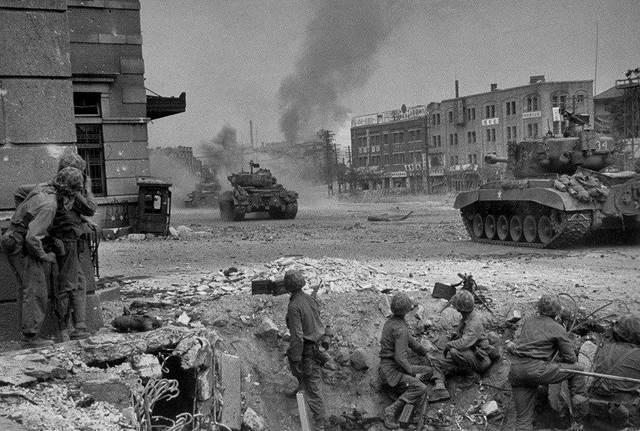
1950年,汉城战役交火现场。 
1950年,一支美军纵队从长津湖败退,通过一段被称为“梦魇小径”的峡谷公路。长津湖战役 是第二次战役东线的一场恶战,志愿军第九兵团以巨大伤亡为代价,将美军逐出该地区。
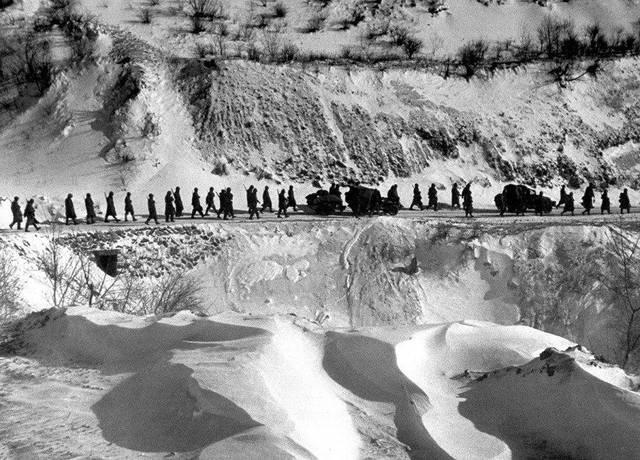
1950年,一支美军纵队从长津湖败退,通过一段被称为“梦魇小径”的峡谷公路。 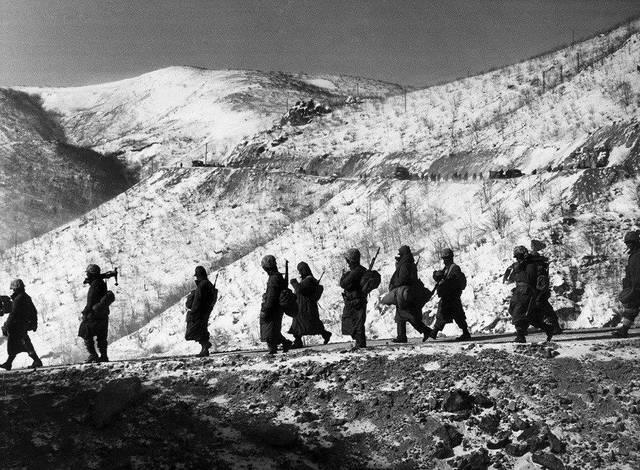
1950年冬,美军从长津湖败退,通过被称为“梦魇小径”的公路上,美国海军陆战队的车队受阻。 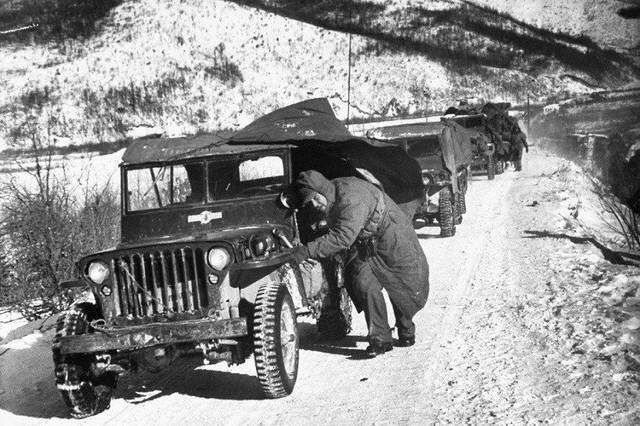
1950年,美军从长津湖败退。 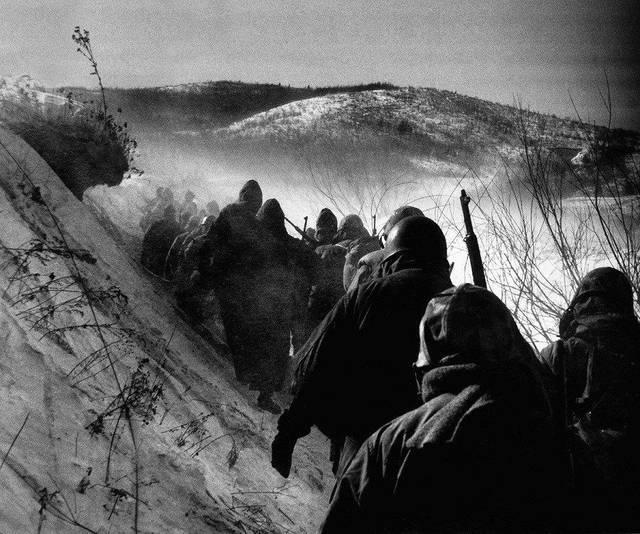
1950年12月,美军从长津湖败退,士兵们跟在一辆运送尸体的卡车后面 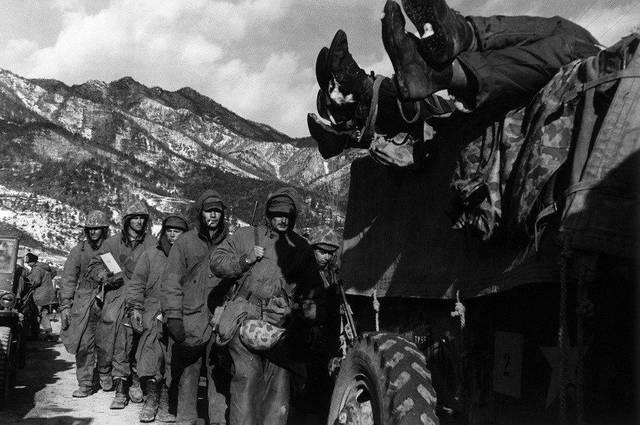
1950年12月,美军从长津湖败退,一个士兵在吉普车上睡着了,他的小狗一直在他耳边哀嚎。 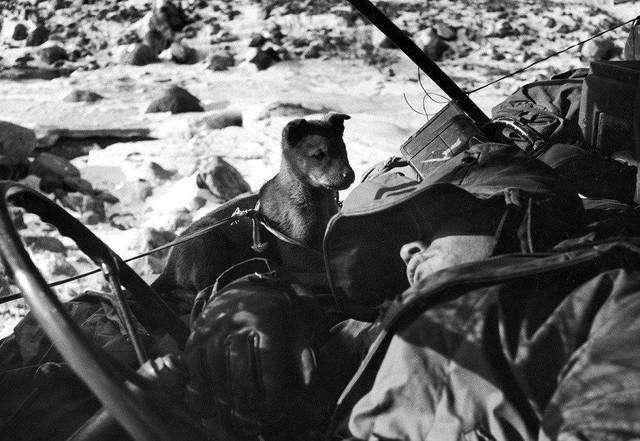
1950年12月,美军在长津湖溃败,士兵们从战友的尸体身边匆匆撤退。 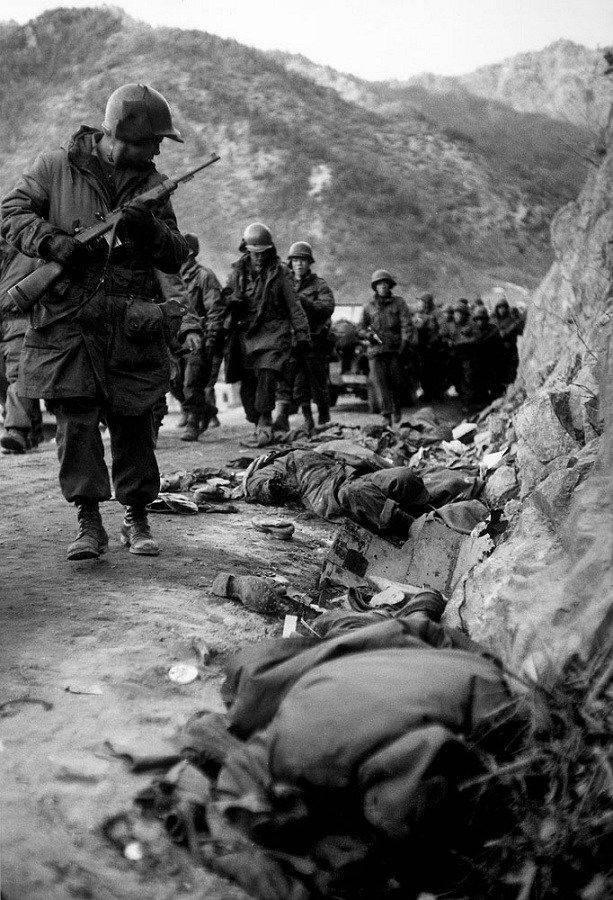
1950年12月,美军纵队从长津湖败退,在通过一段被称为“梦魇幽径”的峡谷公路后,在路边休息。 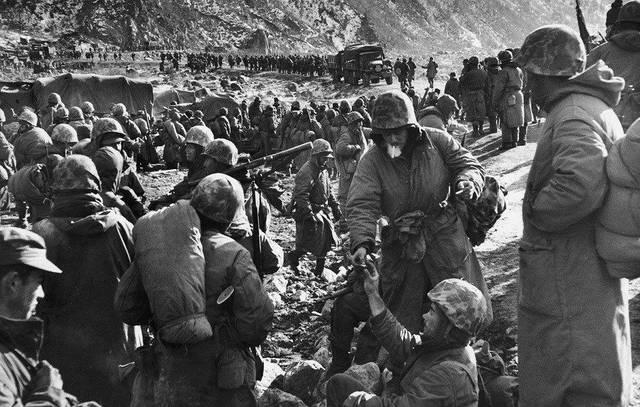
1950年冬,从长津湖败退的海军陆战队士兵,紧握罐头,一脸茫然。 
1950年冬,从长津湖败退的美军士兵围上围巾以抵御严寒。 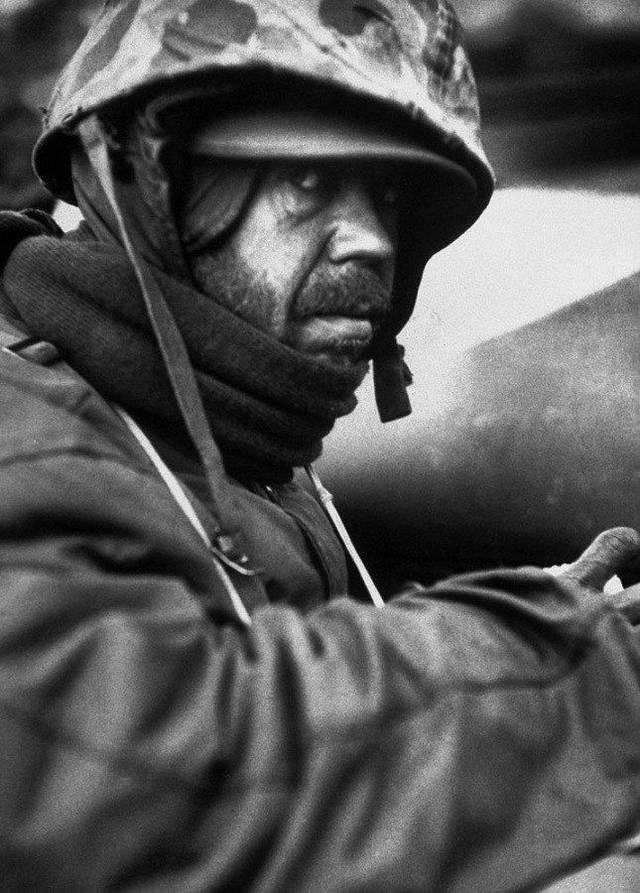
1950年冬,从长津湖败退的疲惫美军士兵蜷缩在大衣中以抵御严寒。 
1950年,朝鲜战场。 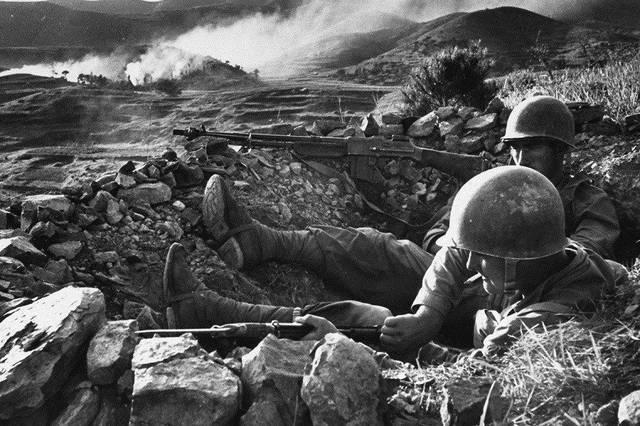
1950年,在知道弹尽粮绝后,芬顿上尉在思考他和他的部队的命运 
发现弹药用完后,海华斯下士完全绝望了 
1950年,一个救护车司机知道他的朋友被地雷炸死后,在路边呜咽 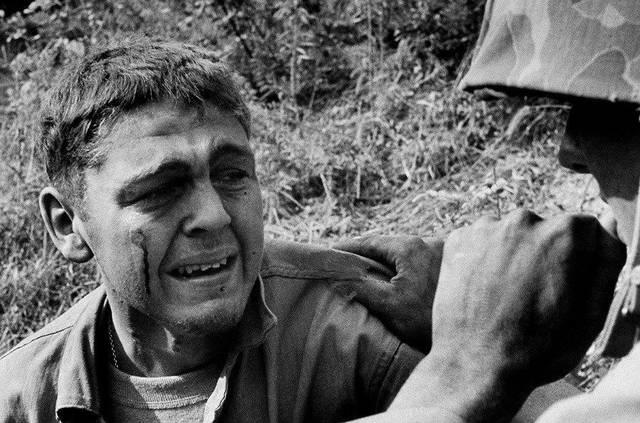
1950年,一个受伤的美军士兵被韩国民众从机枪位前抬到担架上 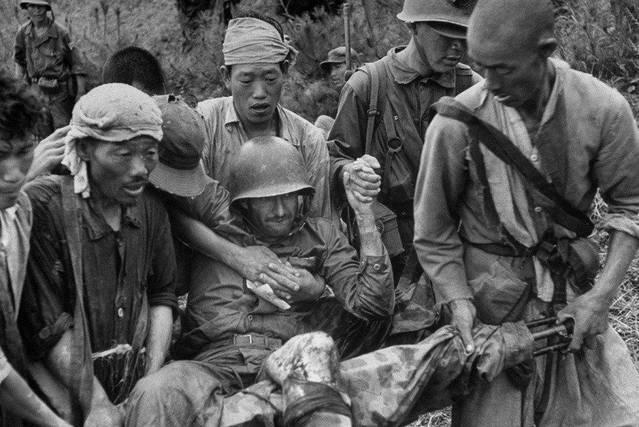
1951年,朝鲜战场前线 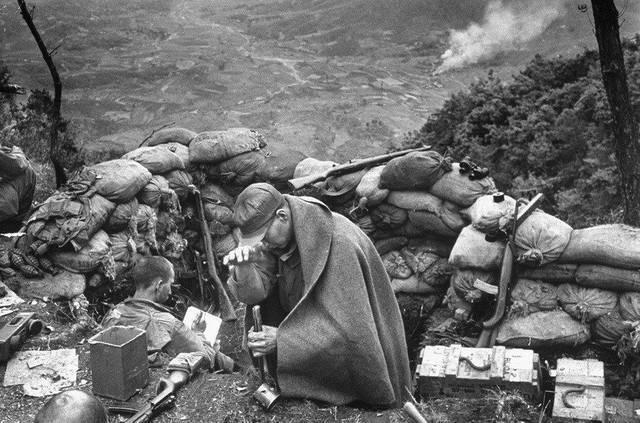
1951年,一个打盹的美军士兵 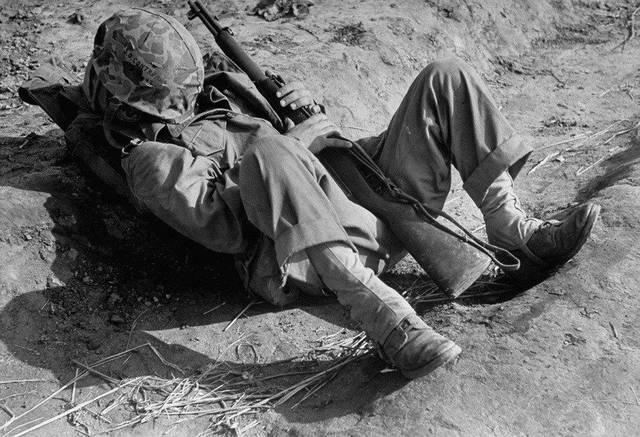
1952年,美国和韩国军官在研究地图 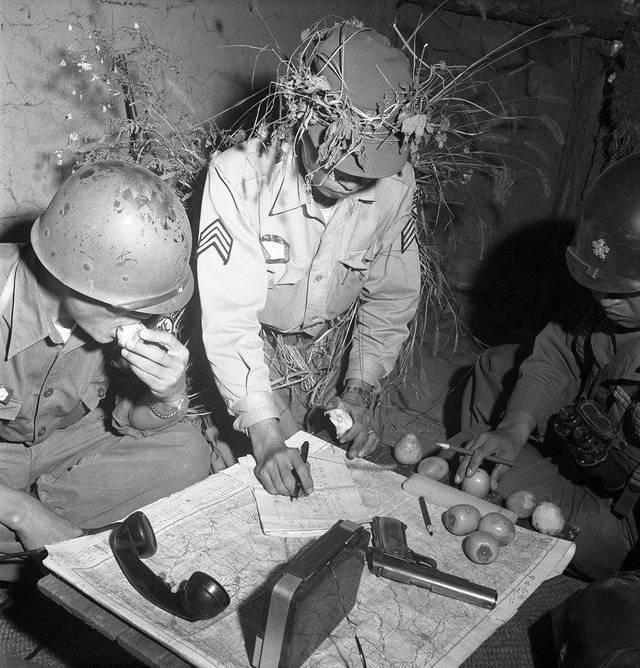
1952年,巡逻的美军士兵 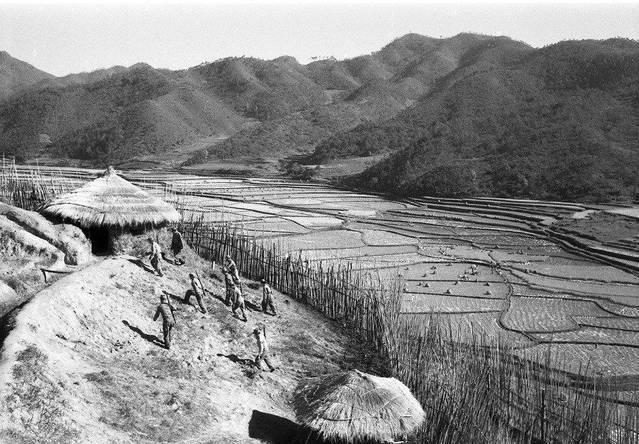
1952年,一个在朝鲜战场上服役的美军士兵 
1951年,“联合国军”中的土耳其军队 
1951年,“联合国军”中的土耳其军医在包扎伤员 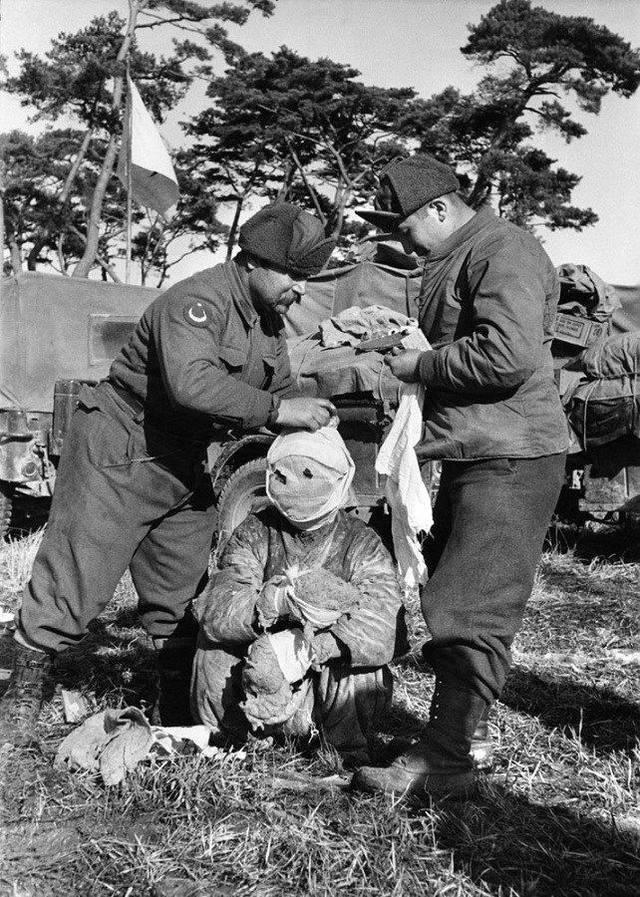
1952年,在战争中死难的韩国军民 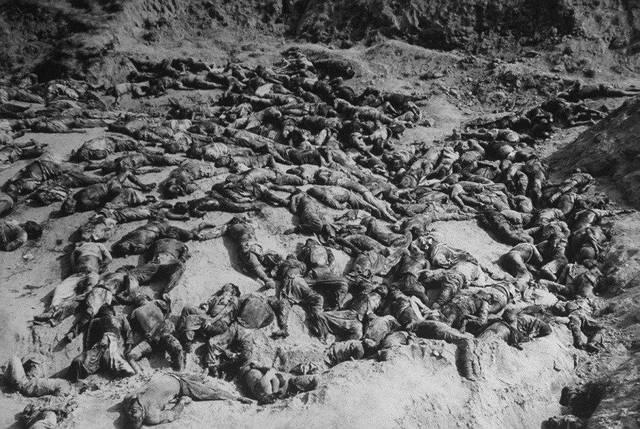
1953年,美军第五航空队的F-86“军刀”喷气式战斗机 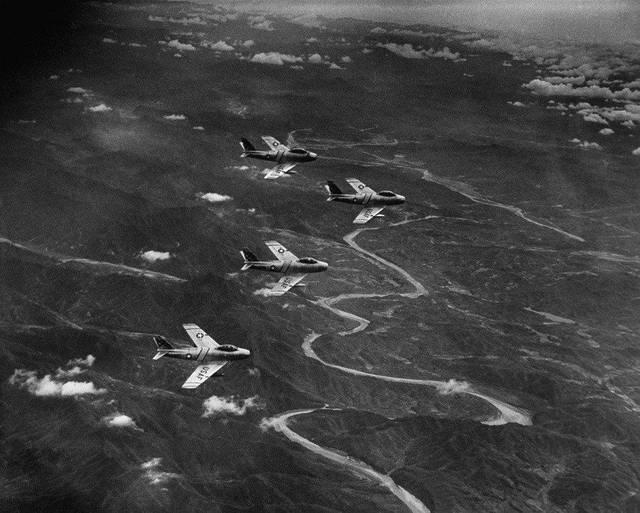
1953年停火后,志愿军在搜寻尸体,一个战士上前制止美国记者拍摄 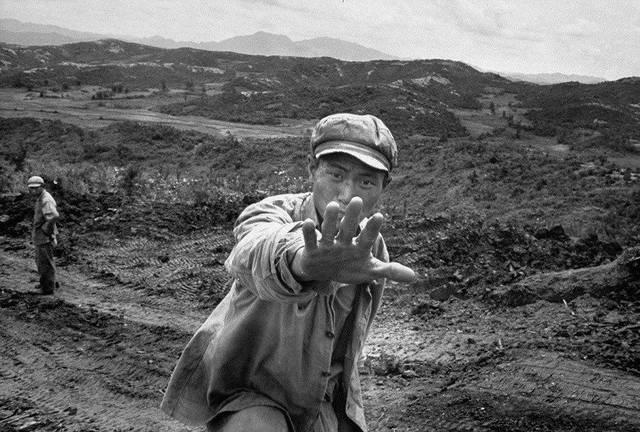
1953年战俘交换时,一个被俘的美军士兵正在被审问 

1951年5月6日,驻华北独立11团举行赴朝参战前的动员。 有几个士兵注意到了镜头,往后面看了看。 
1950年底,中国农村青年报名参军,骑着马,胸前挂着大红花。 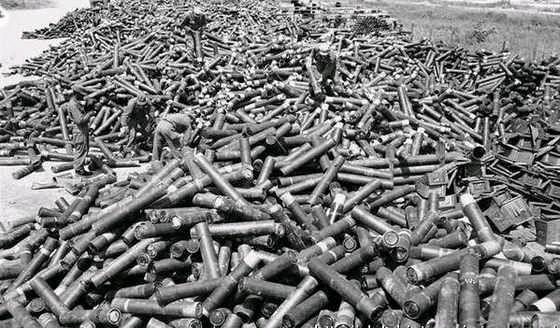
1953年5月,美军炮兵阵地的空弹壳堆,“范弗里特弹药量”,以5倍于普通 炮击弹药量的饱和打击中方阵地。 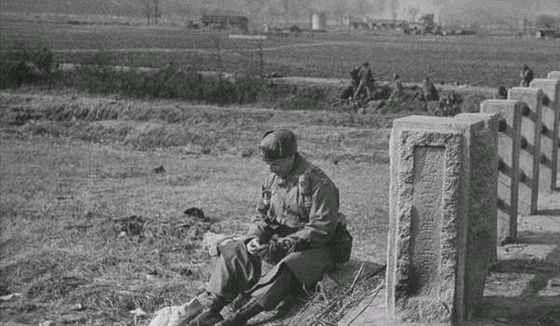
1951年2月,安养前线,第八集团军司令李奇微在视察途中休息。他的胸前 总挂着两枚手雷,他说这是遇到敌人“最后也最有效的手段”。两个月后, 李奇微成为远东盟军总司令,领导美军挡住了中国军队的进一步进攻。

志愿军留影 
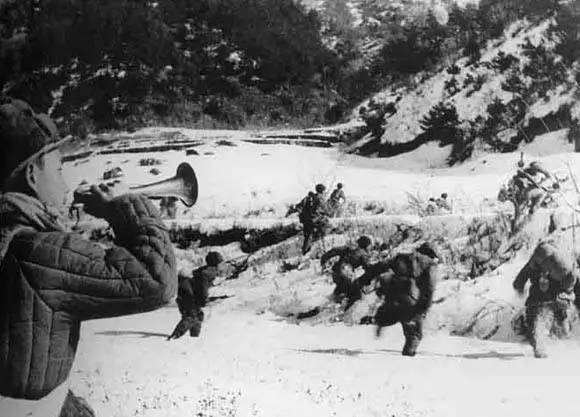
志愿军牺牲的绝大部分高级军官,都是在拒绝五步方案的第四次战役 以后,此后志愿军的伤亡人数占到了三年朝鲜战争总伤亡人数四分之 三以上。牺牲的军官有正团级以上干部180多人、师以上干部24人、军 以上干部6人,包括20军后勤部长喻求清、39军副军长吴国璋、后勤部 副政委邱世清、67军代军长李湘、23军副军长饶惠谭、20兵团保卫部 长冯建屏、50军副军长蔡正国。共产党建军以来第一次整师建制被歼 (180师)也是在第五次战役,师代理政委兼政治部主任吴成德被俘。 此役志愿军被俘17000人,占志愿军被俘总人数的百分之八十。
在拒绝停火以后两年多的战争中,中国物力财力兵力的消耗都是巨大且 无谓的,中国进入联合国也推迟了二十多年,致使台湾问题至今还让大 陆头疼。如果当时毛泽东同意这一决议,就不会有14000名志愿军战俘 选择去台湾,也不会有是台湾还是大陆的制度哪个更好些,哪个中国 的人民生活得更幸福些的比较了。
由于第四、五次战役让毛泽东明白了没能力打赢这场战争,他转变态 度急于寻求停火。但因为他拒绝过联合国的停战决议,不好意思 直 接向联合国要求停火,只有在51年6月13日发电报指示高岗去请苏联出 面“向美国政府试探停战问题”。 毛泽东在同斯大林协商后提出了如 下条件:
1、1951年__月__日,双方同时发布停火命令(先不签协议),双方在 朝鲜的陆、海、空军力量停止敌对行动。 2、双方陆、海、空力量从三八线各后撤10公里,在三八线向北和向南 10公里地区建立非军事区。在非军事区的民政机关恢复到1950年6月25 日以前的状态。三八线以北属于朝鲜人民政府管辖,三八线以南属于 南朝鲜政府管辖。 3、双方停止从外部向朝鲜调运装备,调动或补充人员(包括陆、海、 空运输)。 4、双方遣送战俘。在停止军事行动后3个月期限内,每一方应分批全 部交换战俘。 5、在朝鲜所有交战的外国 军队,包括中国人民志愿军,在2-3个月期限内应分批全部撤离南北 朝鲜。6、南北朝鲜难民在4个月内应返回从前居住的地区。”
但这一次的停火要求是由联合国的对手中国先提出的,就轮到美国 掌握主动权了,这六条全被美国否决。
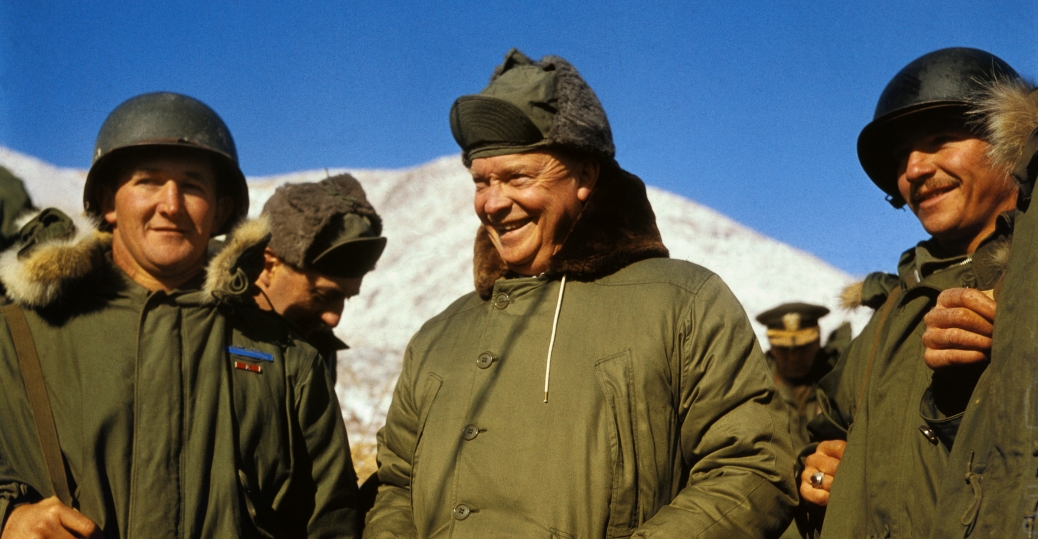
Eisenhower oversaw the end of the Korean War, the first major diplomatic and military confrontation between America and a powerful communist foe. 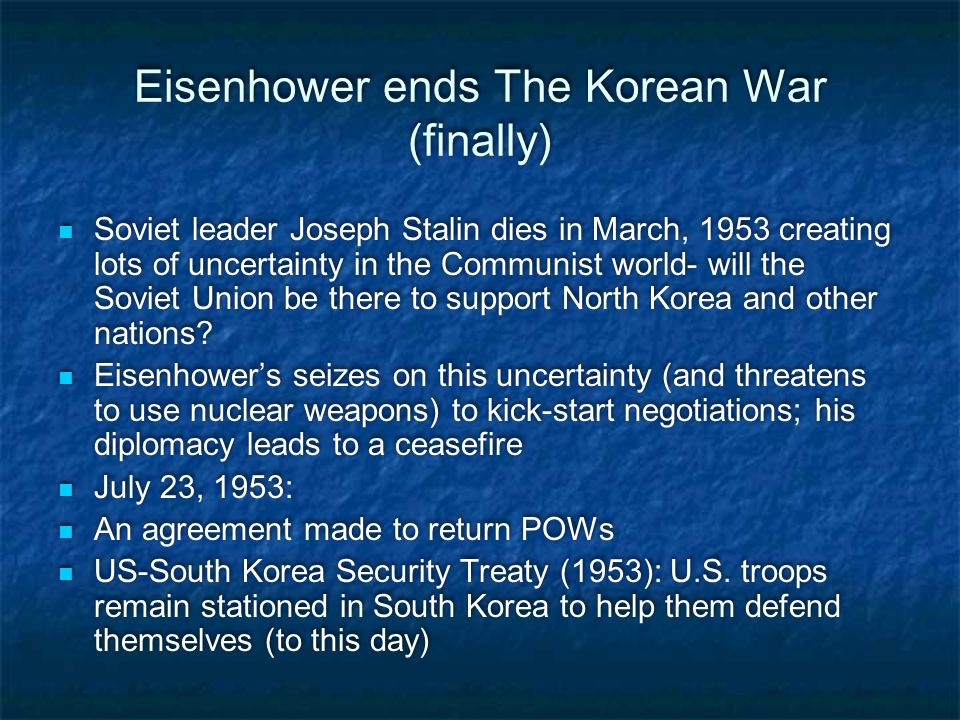
毛泽东无可奈何,只希望赶快停火,到后来就把所提条件统统 放弃。也不再坚持把解决台湾问题和联合国的中国席位问题作 为停火先决条件了。为此他找了个借口,在电报中说:“联合 国实际上已成为侵略工具,所以中国现在不认为进入联合国的 问题有特别意义”。而在这以前毛泽东曾强硬地要求加入该 “侵略工具”,要把台湾挤出去。

1951年1月17日,毛泽东在授意外交部部长周恩来致电联合国秘书长戴维·欧文、明确拒绝 对于中国、朝鲜极其有利、以中国完胜、美国为首的联合国军干涉失败为战争结果的联合国 停战五项步骤提案之后的第九天,也就是1951年1月26日,出席文章开篇提到的印度首任驻 华大使举办的印度国庆招待会。此时,九天前刚刚作出影响如此重大、如此深远战略决策的 毛泽东 ( 1893年12月26日 - 1976年9月9日,享年 82 周岁零8个月14天 ),时年 57 岁 零1个月整。
Chairman Mao Zedong attends the Indian National Day Reception held by Ambassadors of India to China Kavalam Madhava Panikkar on January 26, 1951 in Beijing, China.
由于毛泽东内战内行外战外行一意孤行,让战争晚结束了 两年多,让本应当是中国大胜局的战争以平局结束了,还 多死了许多人。如果再考虑到台湾没能解放的问题、联合国 席位推迟了十几年的问题、美国重新把朝鲜台湾等列为其 第一防卫岛链等诸多问题,所谓的和美国打了个平局,也 只能说是 自欺欺人的 平局罢了。

1953年7月27日,朝鲜停战协定在板门店签订,到晚上22时,枪炮声嘎然而止,稍后, 前沿双方官兵都从战壕中探出头来,然后一起欢呼。第二天早晨,阵地上的澳大利亚团 第2营士兵走出堑壕,第一次安全享受清晨的阳光,而志愿军士兵也走出来清理和破坏 坑道工事,为撤离作准备,于是,中澳士兵走到了一起。 











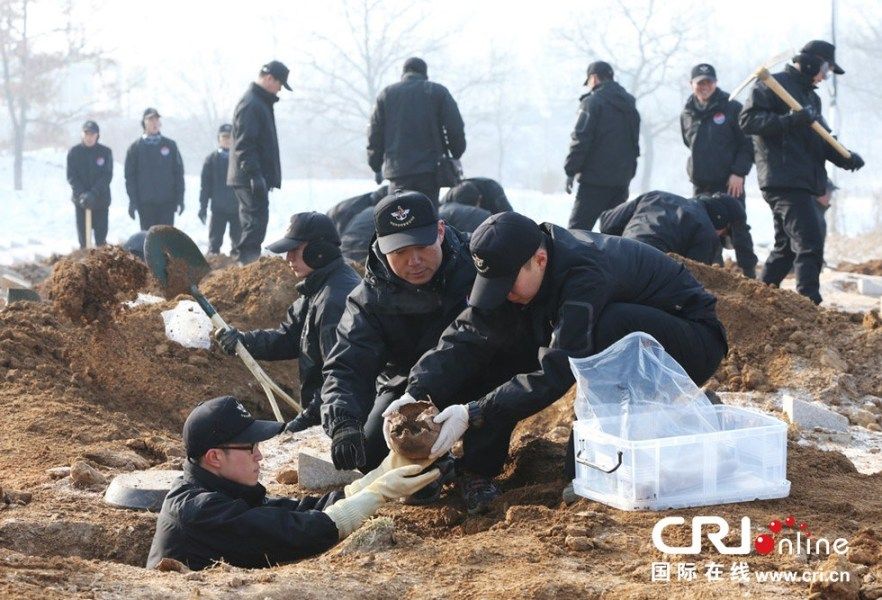



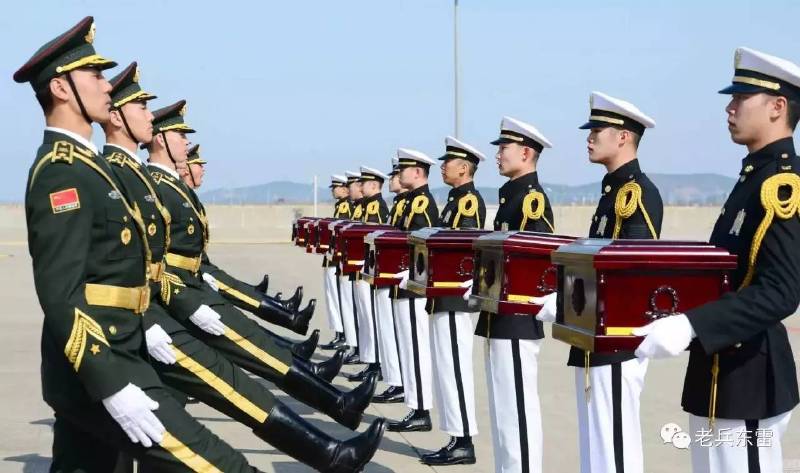

最寒冷的战争 —— 长津湖战役 https://www.youtube.com/watch?v=kH-xJxBNuVM
作者:Pascal 回复 悟性随行 留言时间:2017-10-28 13:33:26
可是啊,这一回,你的主要敌手、次要跟班 —— 各大中小国构成的 联合国,不惜认输、认栽、认败,几乎完全满足了你所有要求、
把台湾绑在一块儿和英、美、苏三大国一起谈、 把占有联合国安理会席位绑在一块儿和英、美、苏三大国一起谈, 把双方停火分界定在了三七线、汉城 —— 乖乖 —— 都给了你,
给足了你最看重、最在意、最讲究、最不依不饶的面子 —— 面子 是啥?就是脸啊! 你却不要! 你却红口白牙,口儿正得很!! 不屑 一看、不屑一听,一口回绝! 誓要一举、二举、三举歼灭美军完整 建制一个师、两个师、三个师、四个师 ...... 誓把侵略工具 —— 联合 十六国将士赶进汹涌澎拜、巨浪滔天的海洋咸水里。
你要这么有骨头、有胆识、有魄力、有原则、有底线、有红线、有壮志 和雄心,有运筹和帷幄,有大略和雄才,不把十六国侵略军干掉死不休, 1951年6月美帝全部否定你的谈判六项条款,你别改口往后撤啊!!! 不接受我的六款,就他妈给我往死里打!!!! 一直打下去,一直打到 2017年10月28 这一天。
因为,因为,世界正义在我这一边! 地球公理、宇宙道德、仁义、公道、 人心统统一概全部彻底在我这一边!!!! 谈,是谋略; 不谈,也是 谋略! 对我超级有利,我打死不接受!!! 对我极为不利,我签字, 认了! 咋地? 你、你、你、还有 他妈的 你, 有点儿意见, eh ?
作者:悟性随行 留言时间:2017-10-28 07:32:54
战争规律 : 骄兵必败, 无论对谁都适用。
作者:Pascal 回复 和颜清心 留言时间:2017-10-28 03:21:49
谢谢清心留言关注。
法国启蒙思想家、哲学家伏尔泰(1694-1778)有一句名言: Le mieux est l'ennemi du bien. ( The perfect is the enemy of the good. ) 最好是好的敌人。
另有这样的短语,形容忘乎所以: grow so swell-headed and conceited that ... Be carried away by one's successes
以大幅照片为主要篇幅的长文,没有泛叙三年的朝鲜战争,而 仅仅、 仅仅、仅仅 详述了一件事情、一封电报:
1951年1月17日,毛泽东授意外交部部长周恩来致电联合国 Acting 秘书长戴维·欧文、明确拒绝对于中国、朝鲜极其有利、实现参战的 几乎全部目标、以中国完胜、美国为首的联合国军干涉失败为战争 结果的联合国停战五项步骤提案。
作者: 和颜清心 留言时间:2017-10-28 02:22:07
过去曾看过高晓松等人对朝鲜战争的介绍,感到您的介绍更翔实,我想 如今大部分人生活在和平环境,或许不太愿意回忆这些残酷的事了—— 真心祈盼天下和平,千万不要让历史再重演这些悲剧了。
|
